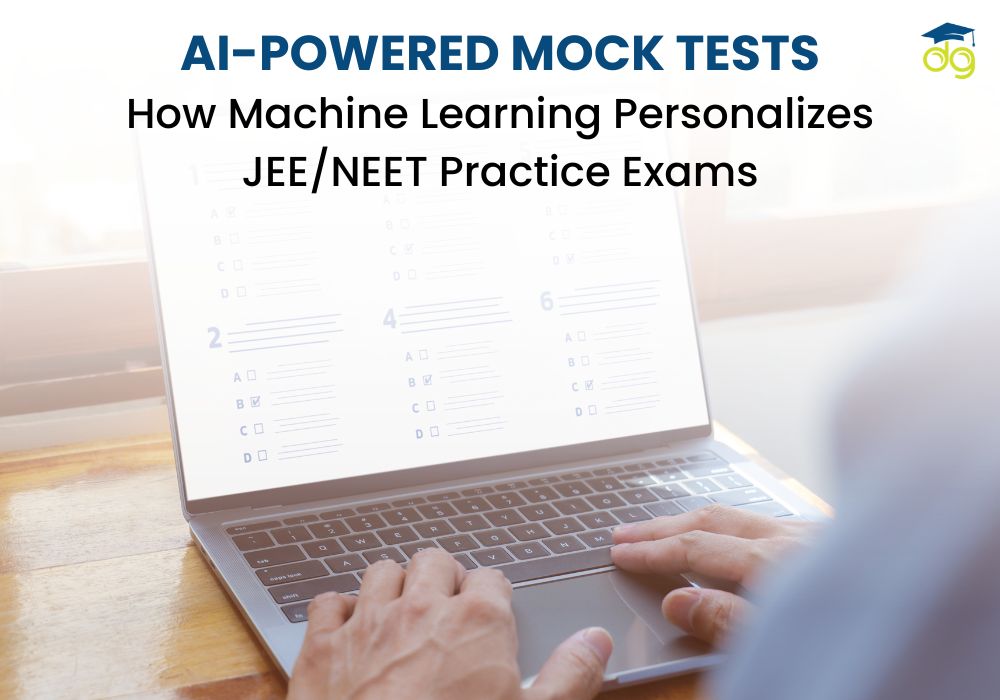English Preparation for Banking Exams: Grammar, Vocabulary & RC Tips
Step-by-step guide to master English for IBPS, SBI, RBI & NABARD exams
English is difficult only when you don't plan effectively.
In the case of lakhs of banking hopefuls across India, the English language section in bank exams can be a major aspect. Although reasoning and quantitative ability are both improved through practice, English demands consistent reading patterns, a firm grasp of grammar and well-developed vocabulary. A lot of students are naive about the subject, believing that it's "easy," only to find out in the test hall that it's actually a fast-paced and precise game that requires a strategy.
If it's IBPS PO or SBI Clerk RBI Assistant, or NABARD tests, English is compulsory. Section tests are not only fundamental grammar but also understanding, vocabulary, errors recognition, and even logical comprehension skills.
This is where a structured approach to preparation is essential and is where getting the correct guidance can play an essential part. Finding a reliable coach institute or platform is a challenge with the many choices available, however Skoodos Bridge -- the leading platform in India for identifying and comparing schools can make it simpler through confirmed listings, user reviews and in-depth guidance.
On this blog, you'll discover:
- How can I learn English for bank exams step-by-step
- The most crucial grammar rules, vocabulary tips and strategies for RC
- The most common mistakes that students make during English examination
- How to increase your reading speed and precision
- What the Skoodos bridge aids students to find the best coaching institutions that can help them prepare for English as well as general bank test preparation
Understanding English Preparation for Banking Exams
What is the reason why English is crucial in bank exam preparation?
English isn't an exam subject; it also reveals a candidate's abilities to communicate, their decision-making capabilities and efficiency in reading. When working in jobs such as bank, insurance and other regulatory positions officers have to communicate with clients as well as write reports and read the official documentation. Thus, English is a core part of the syllabus.
Example:
- IBPS PO: 30 questions in Prelims and 40 questions in Mains.
- SBI PO: 30-question in Prelims 35-40 questions in Mains.
- RBI Grade B: A higher weightage and higher comprehension and writing.
The pain points that students have to face
- Grammar confusion: Rules vs. application.
- A weak vocabulary: Not knowing what synonyms and antonyms mean.
- slow reading speed: Struggling in RC passages.
- Negative marking: over-attempting without accuracy.
- Too many websites: Not sure which institute or book to put your trust in.
Step-by-Step English Preparation Strategy
A clear and concise plan to follow for English preparation over the areas of Grammar, Vocabulary and Reading Comprehension.
1. English Grammar for Competitive Exams
The grammar matters
Around 40% to 50 percent of English questions on bank exams comprise grammar. In the absence of mastering grammar, students score low on error spotting, sentence correction, fill-in-the-blanks, and cloze tests.
Important grammar topics for bank exams:
- Sub-verbal agreement
- Tenses and the correct use of them
- Articles & determiners
- Prepositions (in, on, at, by, etc.)
- Pronouns and their antecedents
- Modifiers and conjunctions
- Active Voice vs. Passive voice
- Direct and indirect speech
- Common errors (double negatives, miss-placed modifiers)
Best practices:
- Learn the grammar rules using textbooks (Wren Martin and Wren S.P. Bakshi).
- Keep a notepad with a list of commonly-made mistakes in English.
- Solve sentence corrections for exams daily.
- Make use of test-prep for the English section for a chance to practice rules under exam-like pressure.
2. Vocabulary for Banking Exams
What vocabulary is critical
The vocabulary directly affects performance terms of synonyms, antonyms, para jumbles, tests with cloze and RC-related passages.
The best way to enhance vocabulary to pass bank exams:
- Read English newspapers daily(The Hindu and the Economic Times).
- Make use of apps such as Vocabulary.com and flashcards.
- Keep a word diary with 5 words per day (meaning and the usage).
- Practice confusing words in English (affect vs effect, and accept vs except).
- Revision vocabulary list for bank exams regularly.
3. Reading Comprehension (RC) for Bank Exams
The reason RC can be challenging
It can be unpredictable. Questions could focus on economy or philosophy, banking or even current events. Candidates struggle with time management and inference based questions..
Top tips for understanding the bank exam's reading:
- Avoid reading word by word - use skimming and scanning.
- Find keywords in the question before reading.
- Pay attention to your main idea, tone, and the conclusion of the paragraph.
- Beware of assumptions and stay with what's provided.
- Learn by using English comprehension exercises taken from previous IBPS/SBI exams.
4. English Test Practice & Mock Exams
Regular practice is the only way to build confidence.
- Learn English exams to prepare for bank exams each week.
- Examine mistakes and identify the weak points (grammar vocabulary, vocab, RCR).
- Utilize sections for timers (20 minutes for the English Prelims).
- Try the mock test English section with trusted platforms.
Common Mistakes Aspirants Make
- Simplifying the process instead of learning basics.
- Ignoring vocabulary and thinking grammar is enough.
- Translation while studying RC, which wastes time.
- Responding to the pressure of peers and joining a coaching team without doing any research.
- Choosing institutes by popularity, not by verified student results.
How Skoodos Bridge helps:
- Verified listings of institutes take out false assertions.
- Review and rating provide real-life experiences for students.
- Tools for comparison make it easier to shortlist institutions.
Tips & Best Practices
- Start English prep 6-12 months before the test.
- Examine at least 3 institutes before registering.
- Check faculty credentials on Skoodos Bridge.
- Read 1 editorial daily for vocabulary & the ability to read.
- Do practice Previous year English PYQs to prepare for the IBPS/SBI exam.
- Use location filters on Skoodos Bridge to reduce travel time.
Skoodos Bridge Spotlight
In the case of preparation for banking exams, Skoodos Bridge is the best option.
Features that make it stand out
- Verified listing of the institute
- Advanced filters (fees or location courses, location)
- Students' reviews and ratings
- Professional counseling assistance
- Discovery based on locations
- Comprehensive profiles of institutes
- Discussions in the community for learning with peers
Find the most suitable English training institute right now with Skoodos Bridge. Then take your first step to pass your ideal banking test.
Conclusion & Takeaways
English exam preparation for banking can be easy if you prepare carefully. By balancing proficiency in grammar along with vocabulary and practice with reading comprehension candidates can achieve very well in this part.
The problem isn't just the preparation, but rather finding the most appropriate direction. This is where Skoodos Bridge helps save time, eliminates confusion and provides transparent, verified details on the most effective training institutes.
FAQs
1. WHow to prepare English for banking exams?
Learn the grammar rules Learn vocabulary each day and practice RC passages. Practice mock tests for improvement in efficiency and speed.
2. Is English tough in banking exams?
Not if you practice regularly. A lot of students do not bother however, with time this becomes a simple to score section.
3. How many questions come from grammar in bank exams?
In prelims, around 10-12 (error spot and sentence corrections, fillers).
4. Does Skoodos Bridge cover both online and offline institutes?
Yes, students can explore and compare both modes.
5. Can I compare multiple institutes on Skoodos Bridge?
Absolutely. It allows for side-by-side comparisons of costs, locations and reviews of faculty.
Categories
Archives
- October 202514
- September 202520
- August 202522
- July 202524
- June 202524
- May 202526
- April 202530
- March 202523
- February 202513
- January 202523
- December 202429
- November 20246
- September 20245
- August 202422
- July 202415
- May 20249
- June 202424
Similar Posts

ChatGPT for JEE Physics: Smart Prompts to Master Problem Solving
by Skoodos Bridge

Space Technology Careers: ISRO Opportunities Beyond Aerospace Engineering
by Skoodos Bridge

Digital Detox Strategies for Competitive Exam Students in 2025
by Skoodos Bridge

Subscription Model Coaching vs Traditional Institutes: Netflix-Style Learning
by Skoodos Bridge

Green Engineering Careers: Sustainable Jobs Through GATE, ESE & PSUs
by Skoodos Bridge

Coaching Institute Mergers in India: Impact on Students & Education Quality
by Skoodos Bridge

Pomodoro 2.0: AI-Optimized Study Intervals for Better Focus
by Skoodos Bridge

Micro-Meditation Techniques for Exam Stress Relief in 3 Minutes
by Skoodos Bridge

AI-Powered Mock Tests Transform NEET & JEE Preparation in 2025
by Skoodos Bridge


Leave a Comment